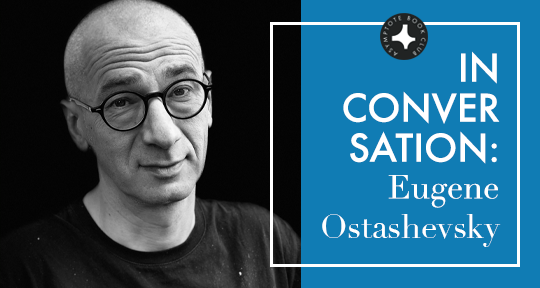Reviewing Yevgenia Belorusets’s Lucky Breaks, Shawn Hoo writes, “The question of what photographs and literature can do in war, I suspect, will not be resolved anytime soon.” Still, as one reads Belorusets’s text of stories from the fringes of wartime, the role of writing within conflict—even if varied and not always discernible—emerges as vital, urgent. Our Book Club selection for the month of March, Lucky Breaks provides a doorway by which the voices and images of Ukrainian women, and their ordinary lives, emerge and connect in unexpected, miraculous ways. In the following interview with Eugene Ostashevsky, whose expert and precise translation of Lucky Breaks has given this title a formidable presence in English, Hoo and Ostashevky discuss the rejections of typical narratives, transitions of impossible grammars, and translating as a pursuit of poetics.
The Asymptote Book Club aspires to bring the best in translated fiction every month to readers around the world. You can sign up to receive next month’s selection on our website for as little as USD15 per book; once you’re a member, join our Facebook group for exclusive book club discussions and receive invitations to our members-only Zoom interviews with the author or the translator of each title.
Shawn Hoo (SH): You have translated mostly Russian avant-garde and absurdist poetry. Were the things that drew you to these poets the same things that drew you to Yevgenia Belorusets’s Lucky Breaks?
Eugene Ostashevsky (EO): I translate as a poet, if that makes sense, which means that translation is vital to my poetic work (which foregrounds translation, which problematises translation) but, more importantly, that my poetics help me make translation choices. I started translating the OBERIU, the so-called absurdists, an avant-garde group in the ’20s and an underground group in the 1930s. The way their work formed me as a reader and a poet, even before I started translating, was their absurdisation of language: the way they took classical poetics and projected avant-garde poetics on them, breaking up classical poetics to build these very beautiful linguistic structures which questioned rather than affirmed language. They questioned rather than affirmed reference or the veracity of statements, and greatly relativised linguistic truth. So here’s the important point: I think maybe what drew me to them was the fact that I’m an immigrant. It was the fact that—I don’t want to say I don’t write in my native language, but—I don’t write in my native language, technically speaking.
With Belorusets, you read Lucky Breaks and there is a lot of Daniil Kharms, member of OBERIU, for the reason that Kharms really reflects on and deconstructs narrative. When Belorusets takes her stories about war and cuts out authorial omniscience, writing about the fog of war, and about interacting with people whom you don’t know much about, she describes these people in this kind of glancing way, often slipping into these Kharmsian rejections of classical narrative.
The second thing is that, like virtually all Ukrainians, she is bilingual. But she writes in Russian because that’s what they speak in her family. Now the Russian language is associated with the Russian state, but there basically used to be, in the twentieth century, two forms of Russian: an émigré Russian and a Soviet Russian. After the Soviet Union collapsed and the émigrés started publishing in Russia—because that’s where the readers were—it turned out that the compromise, the attaching of the language to the political unit of the Russian Federation (even though nobody did it consciously) turned out to be very harmful for the language. [Belorusets] writes in this beautiful, off-kilter, very non-state, non-Russian Russian which has (it sounds like I’m talking about wine) tinges of Austro-Hungarian syntax. Also, she is trained as a translator from German, so that’s also there; beyond that Central Europeanness of her Russian, there is Gogol. You feel that in the ironies, in the way the words and the clauses are not lined up one after another but rub up against each other, the way they are defamiliarised. I just love that.

